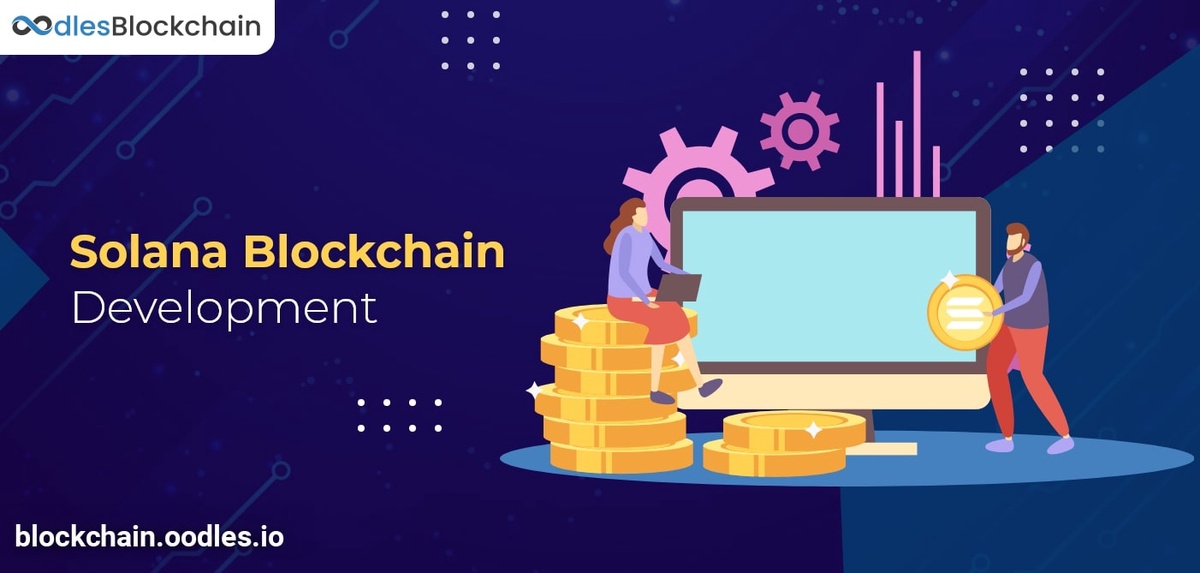Solana blockchain development is gaining popularity for powering the next generation of decentralized applications. The platform provides a scalable, secure, and decentralized infrastructure that can host a lot of nodes without compromising throughput. These features are attracting businesses towards Solana app development. Understand everything about this blockchain solution in this article.
Understanding Solana Blockchain
Solana is a web-scale, open-source blockchain that helps organizations and developers create highly-efficient NFTs, NFT marketplaces, dApps, Defi, and more.
It offers the adaptability of an open infrastructure necessary to develop applications for widespread adoption. It is quick, secure, and censorship-resistant.
This high-performance blockchain network provides a decentralized, safe, and scalable infrastructure for today’s dApps and decentralized markets. It employs innovative processing technologies that can handle thousands of nodes and enable transaction throughput to scale proportionally with network capacity.
Solana combines proof-of-stake (PoS) and proof-of-history (PoH) consensus mechanisms to augment performance and scalability. Subsequently, the network asserts that it can sustain 50,000 transactions per second (TPS), making it the world’s fastest blockchain.
How Does it Work
In a broader sense, the SOL network is a public blockchain technology rendered to increase scalability.
The SOL blockchain not only permits the creation of coins but also fast and scalable decentralized applications (dApps) across the network. As a result, decentralized apps can overcome some of the severe performance limitations.
The PoH consensus technology is another feature of the Solana blockchain. In addition to the PoS consensus technique, it acts as the platform’s internal clock to ensure network security.
Key Characteristics of Solana Blockchain for DApp Development
Proof of History (PoH)
Despite its name, PoH is not a consensus technique. Instead, it is a cryptographic clock that enables nodes to agree on the timing of the chain’s events. To do so nodes do not have to communicate with each other because each node has its clock.
PoH boosts network efficiency and throughput by storing transaction history and making it easy for the system to keep track of the series of occurrences.
Sealevel — A Run-time for Parallel Smart Contracts
Solana can grow horizontally across GPUs and SSDs because of this parallelized transaction processing engine. In essence, Sealevel improves network runtime by allowing parallel transactions on the same chain.
Pipeline — A Type of Transaction Processing that Optimizes Validation
In CPU design, pipelining is a common practice. It describes the operation of allocating a stream of incoming data to various processing components. As a result, network nodes can duplicate and validate rapid transaction information more quickly.
Cloudbreak — Horizontally Scaled Accounts Database
Cloudbreak is a critical data structure for the network’s scalability and throughput. It arranges the account database, enabling 32 concurrent reads and writes across the network.
Archives — Distributed Ledger Storage
Archives are networks of nodes that store network data. Solana’s validators offload data to these basic laptops or PCs.
Gulf Stream — a Transaction Forwarding Mechanism without a Mempool
Solana is able to reach 50,000 TPS only because of the gulf stream. This protocol manages to cache transactions and send them to the network’s edge.
It hugely reduces confirmation time and the memory demands on validators from unconfirmed transaction pools. It does so by enabling network validators to execute transactions beforehand.
Turbine — a Block Propagation Protocol
A turbine is a block propagation technology that divides data into smaller chunks to facilitate data flow between nodes. Solana uses a turbine to improve the network’s overall transaction processing performance and handle bandwidth-related concerns.
Advantages of Solana Blockchain App Development
Solana does not have prerequisites to become a validator, unlike other blockchains. Removing all entry barriers improves the likelihood that participants will benefit from the network.
Additionally, the blockchain features smart contracts that are more scalable than Ethereum. It makes use of the Rust programming language to enable faster processing.
What Makes Solana App Development Better than Ethereum
Even though Solana and Ethereum have a lot of similar features, Solana excels in a few specific areas.
First and foremost, the high transaction fees charged by Ethereum have long been a problem. Occasionally, it exceeds hundreds of thousands of dollars, particularly when the network experiences incredibly high transaction congestion.
In the instance of Solana, it has a far higher transactional capacity per second than its rival.
Solana’s transaction costs are significantly low — 0.000005 SOL, or commonly $0.001 — and affordable compared to Ethereum.
It is possible to interact with the innumerable apps available if a person carries a wallet with SOL tokens and other tokens based on Solana, such as Sollet or Phantom.
On the Solanart marketplace, users can even buy NFTs. Moreover, exchanging one coin for another utilizes decentralized exchange software like Raydium.
Any action someone does on the Solana network will only require them to pay small fees. It is a huge advantage over Ethereum, which is a little more expensive.
Conclusion
Solana provides a highly promising ecosystem for dApp development. Businesses that are interested in dApp development can utilize this blockchain due to its many benefits. Opt for the right service partner for this blockchain solution.
Oodles can give you the right assistance in developing decentralized applications on Solana. Connect with our Solana Developers to avail of our services.


No comments yet